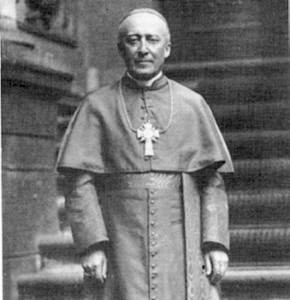Read the first part of Joseph’s story here at “Hidden children in France”.
When the Italian army surrendered to the Allied Forces in Italy, in September 1943, Nice became occupied by the Germans. Massive roundups of Jews by the Gestapo began to take place on a daily basis. This time, we became separated. My parents knew an elderly widow named “Cousine Rose” who agreed to hide them. My brother and I were taken by a non-Jewish lady, Madame Aymard.
Madame Aymard, who collected ivory heads representing various human types, soon became conscious of our “Jewish look.” One evening, she frightened us with the news that the Gestapo was searching the building for Jews. They never came to the door and I am still wondering whether she had fabricated the story. Despite her good will, she felt that the situation was becoming too dangerous. After a brief stay with her, she told us that different arrangements would have to be made for us.
My sister, who had been a member of the Nice section of the Zionist youth in the previous years, had maintained contact with friends who had become members of the Jewish Fighters Organization, a resistance group. They referred her to Moussa Abadi and his network who agreed to take charge of my brother and me. This organization was directed by Moussa Abadi (a.k.a. Monsieur Marcel) and by a physician, Dr Odette Rosenstock (a.k.a. Mademoiselle Delatre), who became his wife after she came back from deportation (1). They were working closely with Monseigneur Paul Rémond, the bishop of Nice, who devoted himself to the rescue of Jewish children and adults. I remember people saying that the bishopric headed by Monseigneur Paul Rémond was under surveillance by the Gestapo.
I have a vivid memory of the saintly Monseigneur Rémond. Shortly before my parents went into hiding, my mother had asked to meet with him to obtain his help in finding a hiding place and she took me along to see him. He received us very warmly at the bishopric located at the villa Dupanloup in Nice and he vowed to do his utmost to help us. I remember that after the Liberation my father was part of a delegation of Jewish community leaders in Nice who expressed their gratitude to Monseigneur Rémond for his exemplary devotion on behalf of the Jews during the Nazi occupation of Nice.
The Marcel Network placed my brother and me with a couple who owned “Cottage Bellevue,” a villa in the Cimiez section of Nice. She was Madame Lemas; he was Monsieur Paul. Officially, the villa was a boarding house for younger children. Besides us, there was indeed a young non-Jewish girl who was occasionally visited by her parents. However, we soon discovered that the couple was also housing two Jewish families, Mr and Mrs Rosenbaum, their daughter and her fiancé, Mr Geshwind, and an elderly couple named Byalistok, six people in all.
After a few weeks, the owners of the villa decided it would be safer for these families to sleep in an unfinished and unventilated basement, accessible only through a wooden trap door. Monsieur Paul and Mr. Geshwind replaced the trap with another, made out of cement, so as to eliminate the hollow noise that could be heard when one walked on it. Should the Gestapo arrive unexpectedly during the night, it would be closed immediately and a carpet rolled over it. Somehow, when the Jewish families began to sleep in the basement, my brother and I left the children’s pavilion and joined them. But the families could not take the lack of minimal comfort and returned to their rooms. We too, then returned to the pavilion.
At the “Cottage Bellevue,” we were treated rather severely, especially by Monsieur Paul. I had a vague idea of my parents’ hiding place without knowing the exact address. On a Sunday morning, I decided to go to the section of town where I thought it might be. After several inquiries, people directed me to Cousine Rose. My parents were frightened by my unexpected visit, which might have proved dangerous for them. Nevertheless, they were happy to see me and welcomed me tearfully. I spent the afternoon with them.
Before leaving for the villa, my mother gave me a bag of grape jam sandwiches. Because she had made the jam herself, those sandwiches were very precious to me. To make them last longer, I hid the bag on a shelf in the closet of the pavilion. Monsieur Paul found them the next day and asked me about this stash. To avoid further questioning, as well as his wrath for bringing in food from outside, I told him I knew nothing about it, He immediately disposed of my treasured sandwiches.
(1) Moussa Abadi and his wife Dr. Odette Rosenstock founded “Le Réseau Marcel” singlehandedly and saved 527 children with the courageous help of Mgr. Rémond, the bishop of Nice. I was among those children. In the course of their rescue work, Dr. Rosenstock was deported but survived. She is the author of an account entitled Terre de détresse: Birkenau, Bergen-Belsen, Harmattan, 1995.
See also http://www.ajpn.org/personne-Odette-Rosenstock-496.html
Read the next part of Joseph’s story: “Hidden children in France”
This account is adapted from: The Hidden Child. Newsletter published by Hidden Child Foundation/ADL Vol. XVI, 2008, pp.23-25
You can find a fuller version in French “Témoignage de Joseph Sungolowsky” in TSAFON, Revue d’études juives du Nord, 2004, pp.21-38, 2004, pp.21-38
See also http://www.ajpn.org/personne-Leon-Sungolowsky-1259.html
Comment on the story here.
